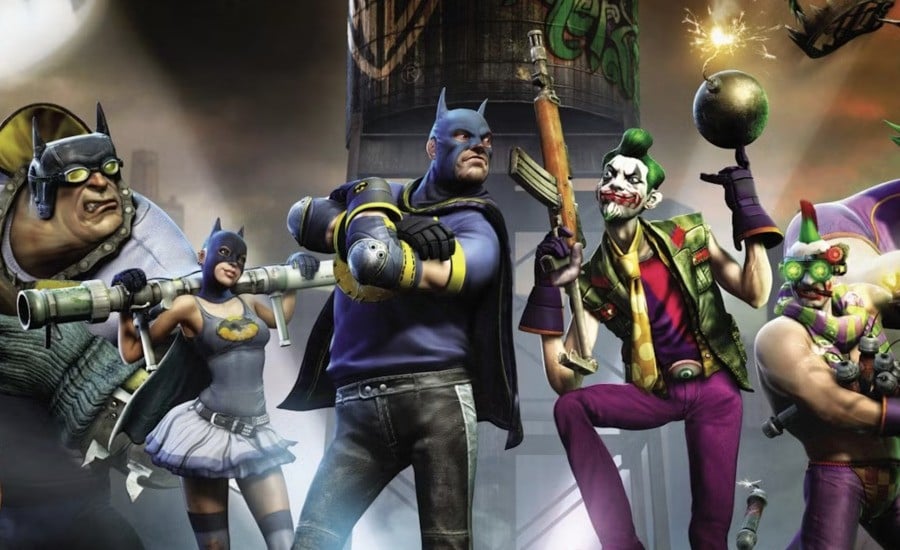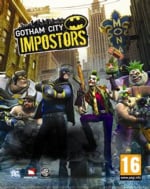
When looking back at the history of video games based on the world of The Dark Knight, Gotham City Impostors is undoubtedly one of the weirder examples from the list of titles that immediately spring to mind.
Released in 2012 for PC, Xbox 360, and PS3, Monolith Productions' first-person multiplayer-only shooter was a title set in the world of the Caped Crusader, but that notably didn't feature Batman at all, instead focusing on the battles between two warring groups of vigilantes known as the Jokerz and the Bats (modelled after the Clown Prince of Crime and The Dark Knight respectively).
Clearly inspired by the opening moments of 2006 film The Dark Knight, in which a pair of Batman impostors attempt to stop a drug deal wearing hockey pads, and the hugely popular multiplayer titles of the time such as Call of Duty and Team Fortress 2, it felt like a genuinely fresh take on the world of the Caped Crusader, but ultimately ended up being a bit of a misstep for the studio, failing to win the same kind of acclaim as its other first-person shooters No One Lives Forever and F.E.A.R. First Encounter Assault Recon.
As you may recall, recently, I spoke to Craig Hubbard, a former game designer at Monolith Productions, for a making of feature. And it just so happened that during that conversation, he also ended up talking a bit about Gotham City Impostors, reflecting on the origins of the project and his opinion on why he thinks it ultimately failed, blaming this lack of success on the publisher's decision to charge $15 for the title, despite it originally starting as a free-to-play title, which affected public sentiment.
According to Hubbard, the decision to develop Gotham City Impostors came about due to a rather confusing chain of events that starts with the sequel to the 2005 title F.E.A.R. As he recalled, in the aftermath of that game, two teams started working on follow-ups, with his own team working on a straightforward sequel for PC, while another would work on F.E.A.R 1.5, as it was referred to internally, for consoles. However, he eventually got asked by one of his bosses to produce an original IP instead, dropping plans for F.E.A.R 2, to focus on this concepts for this new project.
Just as work on that game got underway, though, F.E.A.R 1.5 ended up running into trouble, and he was pulled into working on that project to help out wherever he could.
"They asked me to come on and do some level design," he said. "And so before long, the entire company came aboard because it was just in really bad shape. We ended up spending a year to get it out the door. That was a big dramatic thing and after that, I was trying to get the other project back on track, but then there was another priority at the time at the studio that pulled a lot of the people off the team.
"So I was left with a very small amount of people to work with on something," he continued. "[Because of that], after we shipped the original Fear, we worked on this free multiplayer expansion called F.E.A.R Combat, which was by far the most fun I'd had working at Monolith."
As Hubbard told me, the idea for Gotham Impostors was, therefore, to try and repeat the same formula that had worked so well on F.E.A.R Combat, but with a Warners Brothers' IP attached to it.
"We knew that Warner Brothers was very much shifting at the time into an IP-focused thing," said Hubbard, "So I just got the idea of like, 'What if we just do a free multiplayer game?', but let's use one of the IPs, and so our choices were basically Lord of the Rings, Harry Potter, Batman or Lego. Those were the options and I thought 'It's got to be Batman'. I love Batman. I grew up on Batman. He's always been one of my favorite comic book characters and I was a huge fan of the Dark Knight and that scene in the parking garage at the beginning with the fake Batman. So I was like, 'What if we just do something like that?'"
Reflecting on the process of getting the game off the ground, Hubbard told us that it was fairly easy, with the head of WB Games wanting to get the ball moving on the project almost immediately after the initial pitch meeting had taken place. It all seemed to be going well, with the DC Comics division even commissioning a bunch of tie-in comics to help promote the game, but then a decision was made to alter the monetization model for the game, switching it from a free-to-play title with microtransactions (cosmetic items and accelerators) to one that would cost $15 plus.
"Because it was meant to be free-to-play, we had a lot of microtransactions in the game," said Hubbard. "But they were all accelerators. So it was all like stuff you could earn. You could just unlock by playing because we really wanted to stay away from pay to win. We knew what the best practices were because we had done a lot of research on it. So we knew we shouldn't have a bunch of greedy microtransactions. It should all be stuff you can earn."
"At some point though people got cold feet about it being free-to-play, which I think was unfortunately the death knell for the project. Then, when the operations team put it on Xbox Arcade and PSN or whatever, they listed all the microtransactions in the marketplace as opposed to having them in game, so it just looked like we had like a thousand dollars worth of microtransactions and it killed the reviews. All the reviews were like, this is insane. It's a $15 game, but they're insanely greedy. And it just destroyed the perception of the game before it even really got a chance."
To try to remedy this situation, in August 2012, Monolith launched a free-to-play version of the game on Steam, which ended up being more warmly received. But with no new content in the pipeline, the game struggled with finding an audience, leading Hubbard to suggest this back-up plan was all "too little, too late" to rescue the project.
And from there, things only really went from bad to worse for the shooter, with the online matchmaker GameSpy closing in 2014, bringing the servers for the PS3 version down with it.
This was then followed by the game's delisting from Steam in 2021 and the death of the Xbox 360 game store in 2024, pretty much removing all of the available ways of acquiring and playing the game legitimately.
Remarkably, despite all this though, there does seem to be somewhat of a small and passionate community that exists around the title today, thanks to a free fan project called Gotham City Impostors: Free for Everyone. Though this probably isn't sizeable enough to make Warner Brothers consider reviving the shooter anytime soon.

